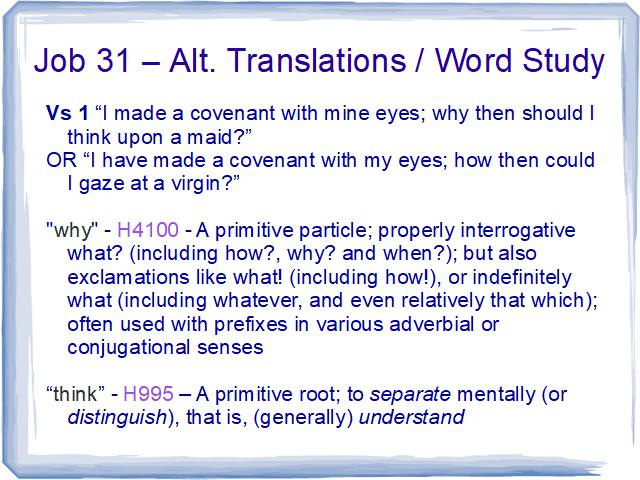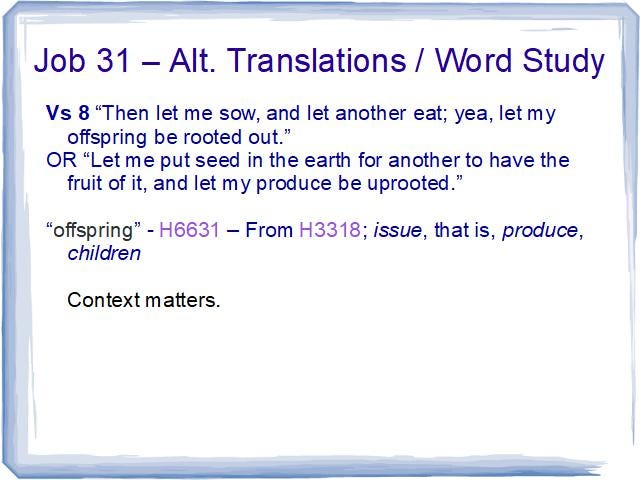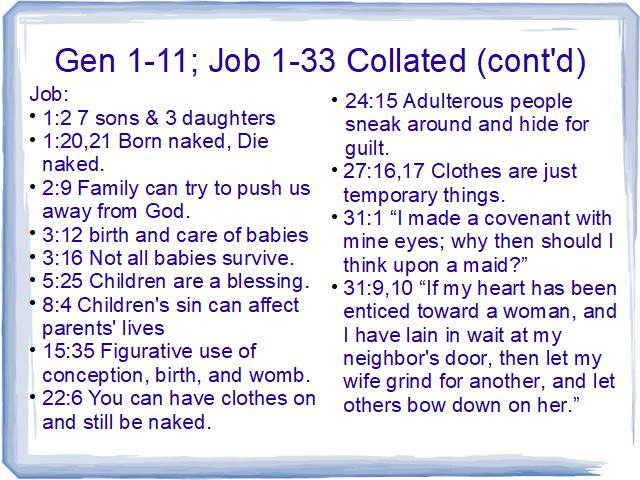Welcome to the Chronological Bible Study Podcast with Nate and Sandra.
I'm Nate.
This is Episode 19, Part 1, the technical study of Job 31-33.
Part 1 is where I go over the technical details of the reading.
Part 2 is where Sandra will come in to have a more personal discussion and where we find more personal applications.
If this is your first time joining us, the process I'm following in this technical study is fairly straightforward.
First, I expect you to read the chapters we'll be going over and making your own notes and analysis.
In just a moment I'll summarize the reading one chapter at a time.
Next, I'll highlight some important verses in each chapter especially those that apply to our chosen topic of sex and marriage.
I'll then compare the reading in different translations which will help bring out translational challenges and bring important words to our attention.
Then we'll get into a bit of a word study using Strong's and other references to dive deeper into the words and you see what they mean.
As needed, I'll have genealogy charts and maps to help make this a little easier.
Lastly, I'll come to some conclusions on each chapter and collate all these conclusions with our prior studies in order to bring all the verses on sex and marriage into focus.
As always, your feedback is appreciated.
Job 31 Summary
Job Part 6
Job starts this chapter by claiming he's made a covenant with his eyes to not even look at a virgin.
We will examine this verse more closely later.
In verses 2-4, he talks about how God is watching so he is very careful to avoid the calamities that fall on the unrighteous. This gives us a "Zeus on the mountain" image with God ready to strike in a moment's notice for the least infraction.
Job then goes into a series of six curses on himself.
They all have the same pattern: If I did X, then may Y happen to me.
Verse 5-8 is a financial curse.
If I have made money fraudulently, let another eat my crop.
Verse 9-12 is a sexual curse.
If I have sought after another's wife, then may my wife have sex with another man.
Verse 13-15 is a power curse because Job has power over his servants.
If I have ignored my servants' complaints, how could I answer when God questions me?
This doesn't correspond well. Job has already been saying that he is God's servant and is complaining, but God hasn't answered him. This almost seems like Job realized he is about to claim that he is a better master than God is and changed it before claiming an obvious lie.
Verses 16-23 is a charity curse.
If I haven't given to the needy, then let my arm fall off.
Now Job's just getting ridiculous at this point.
Verses 24-37 is an idolatry curse.
24 & 25 talks about gold as an idol.
Verses 26 & 27 talks about nature as an idol.
Verses 29 & 30 talks about hating his enemies.
31 & 32 talk about being a good host.
And 33 & 34 talk about idolizing people.
If I have done any of these things I will carry it in public like a sign so everyone will know my sin
verses 38-40 is a food curse
If I have eaten without payment they let my field grow thorns and not grain.
Did you notice what sin is missing from this list?
As we noted in Job 29, Job seems to be proud of his relationship with people and how they looked upon him. At no point did he ever discuss his own humility. The only reference to people was fear of people versus saying the truth.
Of the three categories of sin, lust of the flesh, lust of the eye, and the pride of life, Job pounded the first two into the ground while avoiding the third one completely.
I'm not the only one who noticed this.
Highlights
which we'll add to our collated list on sex and marriage.
verse 1 "I made a covenant with mine eyes. How then should I look upon a virgin?"
verses 9,10 "If my heart has been enticed toward a woman and I have lain in wait at my neighbor's door, then let my wife grind for another and let others bow down on her."
Job 31 Alternate Translations & Word Studies
verse 1 "I have made a covenant with mine eyes why then should I think upon a maid?
or
"I made a covenant with mine eyes, how then should I look upon a maid?"
There are several interesting differences between these two versions.
The first difference is “why” vs “how”. This comes from a word which is a primitive particle. It is properly an interrogative. It could be how? or why? or when? or even exclamations like what! or how! or an indefinite what?! Often used with prefixes in various adverbial and conjugational senses.
So this word could mean either “how” or “why”, but the understanding of the translator changes what question is being asked.
Maybe the other keyword will help?
The word that's translated "think" in King James is the same word that we have looked at before. It's a primitive root, meaning to separate mentally or to distinguish, that is, generally, to understand.
Yes, we have looked at this word before when it was translated as "understanding".
More modern translations translate it as "look" or "gaze".
While there are places where it's translated as "perceive" or some other word pertaining to the eye, it's in the context of examining, where the eye is used along with the mind.
"How then should I look" is a physical question. The maids or virgins are all around Job, or ourselves. The physical looking is inevitable. Stopping himself from looking at young women would be impossible without physically blinding himself.
"Why then should I think" is a mental and moral question. Just because he saw them with his physical eyes doesn't mean that their image or the fantasy of them had to fill his mind. Too many turn a casual glance into an all-night fantasy movie of the mind.
A Christian friend and I were sitting down in a diner in a small town after work when a beautiful teenage farm girl stepped up to be our server. We gave her our drink order then, after she left, he asked how he was supposed to deal with the image of that girl that was so lovely. I asked how he felt about a beautiful sunrise or sunset. He said gratitude to God for making such a beautiful world. I advised him then to give glory to God for making such a beautiful girl.
You could see the chains being lifted from his mind.
Instead of her being a curse to him and a tool for the devil, she became an inspiration for God's praise.
Instead of dreading her approach, he was able to smile genuinely at her and be glad we stopped there for the first and only time in our lives.
How could he look? Easy, she's right there.
Why should he think? Just as easy. She served us food, and we praise God as we went home to our wives.
Many fight the physical looking when the issue of addiction is in the thinking.
Once you find the mental trigger that makes the image desirable to think about, you have the key to unlocking the prison that many men find themselves trapped in.
By the way, the word maid or virgin is a young, unmarried woman.
Job's taking a much higher moral stance for himself than even the Law required.
Verse 8 "Then let me sow and let another eat, yea, let my offspring be rooted out."
Or
"Let me put seed in the earth for another to have the fruit of it, and let my produce be uprooted."
The word used for offspring, or produce, are the same word.
But the context matters.
The context here is talking about plants and food, not children.
It's the same word for both produce of the ground and produce of the father, but I agree that it's more likely talking about his fields rather than his late children as offspring might imply.
Verse 10 "Then let my wife grind into another and let others bow down upon her."
Or
"Then let my wife give pleasure to another man and let others make use of her body."
The word we're going to look at is "grind", which is a primitive root meaning to grind meal, hence to be a concubine, that being their employment.
I bring this up because I've actually heard more than one sermon where the preacherS tried to strip all sexual references out of this verse and claimed that the "grinding" the woman was doing was merely grinding grain and that "bowing down" was fully clothed and respectfully thanking her for the meal and was "bending the knee" in gratitude.
No. This is sex.
The grinding is pelvic grinding as the woman is seeking a clitoral orgasm. Since the wife is doing the grinding to be more blunt in the second version it would be more accurate to say "then let my wife get pleasure from another man"
Bowing down on her is the man's position in their congress.
The word used does mean bow down, but I can understand why they would want to get real clear with what is being discussed.
This isn't talking about food.
Job 31 Conclusions
Throughout all this, Job is going above and beyond all reason and exaggerating his own righteousness.
Verse 18 is par for the course in this regard.
"For from my youth the fatherless grew up with me as with a father, and from my mother's womb I guided the widow."
Seriously?!
He was a father to orphans as a child?
If he had said that he was a friend to orphans as a child, it would make sense.
But a father?
Even that makes more sense in the second half where he guided widows as a newborn baby.
A lot of what Job has said has been reasonable or understandable, but this is getting ridiculous.
He even compares himself to God.
In verse 4, it talks about God numbering his steps.
He uses this phrase to talk about God keeping close tabs on him and making a hostile living environment.
In verse 37, Job says that he can give his own accounting of every step he's ever taken.
Modern folks have step counters to ensure they get a minimum amount of exercise every day.
Every thought, every word, every action is a step. Yes, God knows. We don't. Job is claiming that he can.
Are these claims of righteousness above the law admirable? Maybe.
But is it realistic or even believable? No.
Job Chapter 32 Summary
Elihu part 1
verse 1-5 starts with Elihu's point of view. Job's friends are talked out, and it's not working.
We commended job's friends in the beginning for comforting him in silence. We can commend them again for knowing when it's time to shut up.
verses 6-9 Elihu says he was expecting wisdom to reside with the older men, and he was expecting them to demonstrate their wisdom in this discussion.
verses 10-14 Elihu's still waiting to hear their wisdom
Verse 15. They have stopped speaking out of fear or amazement.
Instead of convincing Job that Job has sinned, they seem more convinced BY Job that he has not sinned.
Verse 16-22 Elihu says what is obvious to us.
He has a lot of words to say.
Highlights:
Elihu is much more organized in his thoughts and discussion than any of Job's friends thus far.
In this chapter, he lays out the "why" of his speech which is a good intro to what he addresses beginning in the next chapter.
verse 2 "...burning with wrath against Job because he seemed to himself more right than God."
This is the core of Elihu's contention with Job. In an effort to prove himself innocent of anything wrong, he's gone to ridiculous lengths to extol his own righteousness and has come just short of accusing God of wrongdoing.
verse 9 "It's not the great that are wise nor the aged that understand justice."
We discussed this last week.
People often ascribe wisdom to the words of the rich or the powerful when that's not always the case. Wealth and power doesn't mean that you're wise. Neither does old age directly equal wisdom or the ways of God.
Verse 12 "I was taking note, and truly not one of you was able to make Job's error clear, or to give an answer to his words."
This seems to be Elihu's key strength. He was actually listening to what Job was saying, while no one else was.
Job 32 Alternate Translations & Word Studies
Verse 21 "Let me not, I pray you, respect any man's person, neither will I give flattering titles unto any man."
Or
"I will not show partiality to any man or use flattery toward any person."
Or
"I will not lift up the face of a man nor eulogize man."
The word in King James is "flattering titles".
It's a primitive root meaning “to address by an additional name hence to eulogize.”
Sometimes you need to define the definition.
Eulogize means "to praise highly in speech or writing".
This is why the more modern translations use flattery, while the more feudal form of flattery would be via titles.
Job 32 Conclusions
Elihu was waiting on older people to demonstrate their wisdom in words, but he wasn't hearing it.
He heard Job's words differently than the others who weren't really listening.
He perceived that they were talking past each other.
Job was asking for certain answers, but no one was giving him what he was asking for.
Elihu believes he has those answers.
Job 33 Summary
Elihu Part 2
Verse 1 Elihu is now addressing Job.
Verse 2 and 3 Elihu is talking.
Verses 4-7 Elihu starts by showing that he and Job are the same created beings by God. Job's friends came off as, "We're better than you." Elihu's trying not to do that.
Verses 8-11 Elihu begins with, "You said..."
This is important because it showed that he was listening to what Job was saying. I didn't go through to make notes of whether these were exact quotes or summaries, but that hardly matters. If Job wants to argue with what Elihu heard to be clear, it'd still be a better conversation than what his friends were having, where whatever Job said was largely ignored.
Verse 12 God is greater than Job.
This is the hinge-pin of Elihu's argument. As much as Job has argued that God is right, Job does not seem to apply God's rightness to his own situation.
verses 13-16 Job is wanting God to speak, but he is not listening to how God speaks over time, in dreams, and through others. Job's expecting a direct voice out of the sky. Elihu is pointing to other ways God speaks.
Verses 17 and 18 talks about why God speaks or acts as he does: "for our benefit".
Verses 19-23 is a reminder that pain is one way God speaks.
Verses 24-30 is another call to repentance and the reward for doing so.
Verses 31-33 Elihu is talking, so answer me, but not yet.
Highlights
Like before Elihu's speech is organized
verse 7 "Fear of me will not overcome you, and my hand will not be hard on you."
This addresses the complaint that Job has had that his friends weren't being gentle with him in his pain. Elihu is promising to be gentle.
verse 8 "But you said in my hearing and your voice came to my ears"
Elihu is acknowledging that both he was listening and this allows for wiggle room in case he heard him incorrectly. In other words, "Here's what I heard. Is this what you meant?"
verse 17 "In order that man may be turned from his evil works and that pride may be taken away from him"
As I already addressed back in chapter 29 when Job was recounting his life, Job's key sin is his pride, the way others view him and the deference they give him. He never talked about his humility or denied his pride in chapter 31.
Elihu is saying that God is doing all this because of Job's pride, which Job still needs to repent of.
Verse 32, "If you have anything to say, give me an answer, for it is my desire that you may be judged free from sin."
Unlike Zophar, who only wanted to pile on, or Eliphaz and Bildad, who wanted to ensure Job's calamity didn't happen to them, Elihu is at least saying that he is interested in Job's welfare more than his own.
Job 33 Alternate Translations & Word Studies
Verse 16 "Then he opens the ears of men and seals their instruction."
VS
"Then he opens the ears of men and terrifies them with warnings."
VS
"That he makes his secrets clear to men so that they are full of fear at what they see."
The word in question is "seals". It's a primitive root meaning “to close up especially to seal.”
The other word is "instruction" which is “an admonition”. It comes from another word meaning “to chastise literally with blows or figuratively with words and hence to instruct.”
I do not understand where they're getting emotionally charged words like "terrifies" or "full of fear".
I had a dream that changed my life. It was a perfect dream. It showed me that I was the one who needed to change. I knew they were telling me the truth, but I was afraid that they were all lying to me.
Once I woke up, the dream was sealed. The instructions were locked away inside me and had to be learned. Some might think this is "terrifying" or "fills with fear", but you can also see it as "liberating" and "hopeful".
Job 33 Conclusions
Elihu starts by assuring Job of his gentleness.
He then shows Job that he was listening to him.
The first critique is, "Job, you've gone too far. God is speaking; you're not listening."
The second critique is, "Pride is your problem."
He then calls for Job to repent of his pride.
Elihu wants Job to be restored like he was.
This is a much better way to handle this situation.
We're not done with Elihu's long speech yet, but I hope Job responds better than he had before.
If you're on the Substack, you'll see that I changed the format of the collated list to be two column instead of just one.
I also separated the Genesis verses to their own list separate from the Job verses.
Today we're adding three new verses to the Job list, Job 31:1 and Job 31 verses 9,10.
We discussed 31:1 extensively as it involves controlling your mind and how to think.
Job 31:9 and 10 are an obvious warning against adultery and the possible results.
For the complete list of verses on sex and marriage that we've gotten thus far, go to Substack's support page where you can see all the charts, maps, and the complete list of verses related to sex and marriage that will grow as we glean more from God's Word.
ChronBiblePodcast.substack.com
In the next episode, Sandra and I will discuss these chapters in a more personal, interactive way.
Next week, we'll look at Job 34-36.
Elihu continues speaking.
He said he was full of words.
Enjoy.


















Share this post